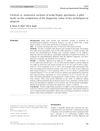
Search
for
Sort by
Research
60-90 / 1000+ results

research Non-Scarring Patchy Alopecia in Patients with Systemic Lupus Erythematosus Differs from That of Alopecia Areata
Hair loss in lupus is different from hair loss in alopecia areata and may indicate lupus activity.

research Topical Minoxidil Counteracts Stress-Induced Hair Growth Inhibition in Mice
Minoxidil helps prevent stress-caused hair loss in mice.

research Primary Cicatricial Alopecias
Early diagnosis and aggressive treatment are key for managing rare scalp disorders that cause permanent hair loss.

research The Efficacy of Using Platelet-Rich Plasma in the Treatment of Androgenic Alopecia: A Literature Review
PRP therapy helps improve hair growth and is safe for treating hair loss.

research Coexistence of Lichen Planus Pigmentosus and Classic Lichen Planopilaris: A Case Report and Literature Review
A rare case of a woman having both lichen planus pigmentosus and classic lichen planopilaris at the same time.

research Cicatricial Alopecias
Some hair loss disorders cause permanent loss due to scarring, and treatments like steroids don't always work well.

research Treatment of Hair Loss
Finasteride and minoxidil are effective for hair loss, but continued research is needed for better treatments.

research Diagnostic and Predictive Value of Horizontal Sections of Scalp Biopsy Specimens in Male Pattern Androgenetic Alopecia
Horizontal scalp biopsy sections effectively diagnose and predict MPAA, with follicular density and inflammation impacting hair regrowth.

research Medical Treatments for Male and Female Pattern Hair Loss
Minoxidil and finasteride treat hair loss in men, while minoxidil treats hair loss in women.

research Interventions for Alopecia Areata
Current treatments for alopecia show no significant long-term benefits.

research S1 Guideline for Diagnostic Evaluation in Androgenetic Alopecia in Men, Women, and Adolescents
Guidelines for diagnosing common hair loss include detailed history, clinical examination, and various diagnostic techniques.

research Variant PADI3 in Central Centrifugal Cicatricial Alopecia
Mutations in the PADI3 gene are linked to a higher risk of scarring hair loss in women of African descent.

research Platelet-Rich Plasma Versus Minoxidil 5% in Treatment of Alopecia Areata: A Trichoscopic Evaluation
PRP more effective than minoxidil 5% for treating alopecia areata.

research Advances in the Management of Alopecia Areata
New treatments for severe hair loss often fail, but some patients see hair regrowth with specific therapies, and treatment should be tailored to the individual's situation.

research Alopecia Areata: Clinical Review and Treatment Approaches
Alopecia Areata has no guaranteed treatment for hair regrowth, but options like corticosteroids and minoxidil are used, with future research focusing on genetic and immune therapies.

research Alopecia Areata Update
Despite progress in treatment, the exact cause of Alopecia areata is still unknown.

research Treatment of Alopecia Areata
Some treatments can help with hair regrowth in alopecia areata, but results vary and long-term use is often needed without changing the disease's outcome.

research Hair and Scalp Changes in Cutaneous and Systemic Lupus Erythematosus
Hair loss is common in lupus patients and can be permanent or reversible, depending on the type, with various treatments available.

research Acquired Scalp Alopecia: A Review
Accurate diagnosis is key for treating different kinds of hair loss, and immune response variations may affect the condition and treatment results.

research Black Dots Seen Under Trichoscopy Are Not Specific for Alopecia Areata
Black dots under trichoscopy can appear in different hair and scalp conditions, not just in alopecia areata.

research Current and Potential Agents for the Treatment of Alopecia Areata
Current and future treatments for alopecia areata focus on immunosuppression, immunomodulation, and protecting hair follicles.

research Treatment Strategies for Alopecia
Some treatments work for common baldness, but there's less evidence for other hair loss types, and more research is needed.

research Male Pattern Androgenetic Alopecia in an Indian Context: A Perspective Study
At least 87% of Indian men experience hair loss, with type II being most common and severity increasing with age.

research How to Diagnose Hair Loss
The document concludes that using specific tools and tests is essential for identifying the cause of hair loss and deciding on the right treatment.

research Androgenetic Alopecia: In Vivo Models
Stump-tailed macaque best for researching hair loss causes and treatments.

research Microbiome in the Hair Follicle of Androgenetic Alopecia Patients
Hair loss patients have different microbes in hair follicles, possibly affecting hair loss.

research Alopecia in Association with Malignancy: A Review
Hair loss in cancer patients can be related to the cancer itself, treatment, or other conditions, and understanding it is important for diagnosis and patient care.

research Minoxidil for Patchy Alopecia Areata: Systematic Review and Meta-Analysis
Minoxidil effectively and safely treats patchy hair loss, but more research needed.

research Vertical vs. Transverse Sections of Scalp Biopsy Specimens: A Pilot Study on the Comparison of the Diagnostic Value of Two Techniques in Alopecia
Transverse scalp sections are better for diagnosing non-scarring hair loss, while vertical sections are better for a specific scarring hair loss called lichen planopilaris.